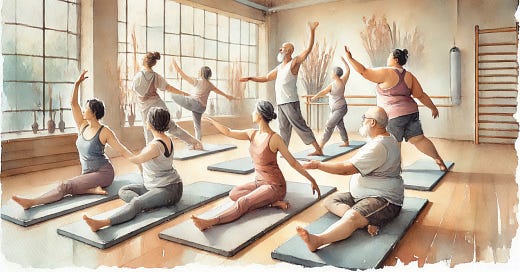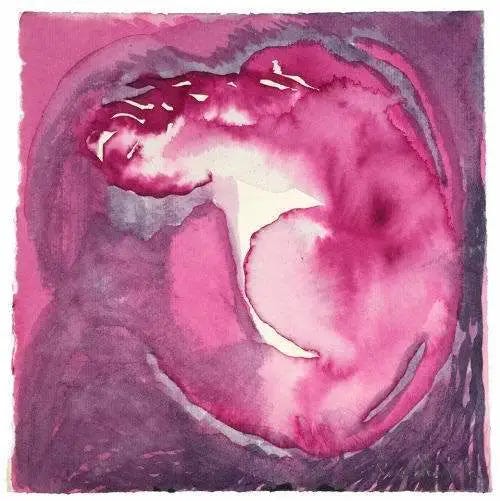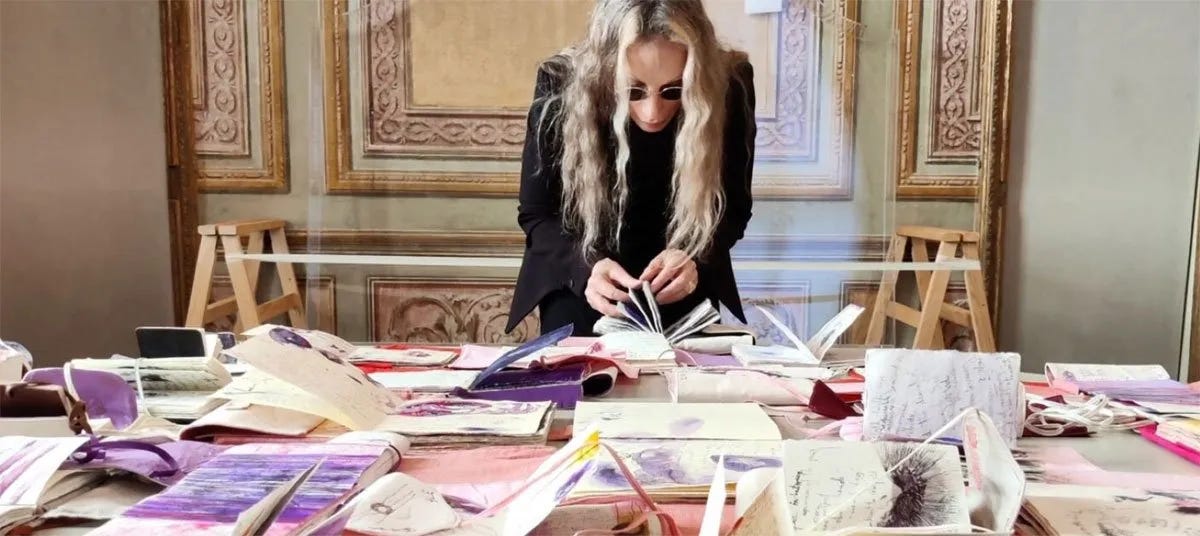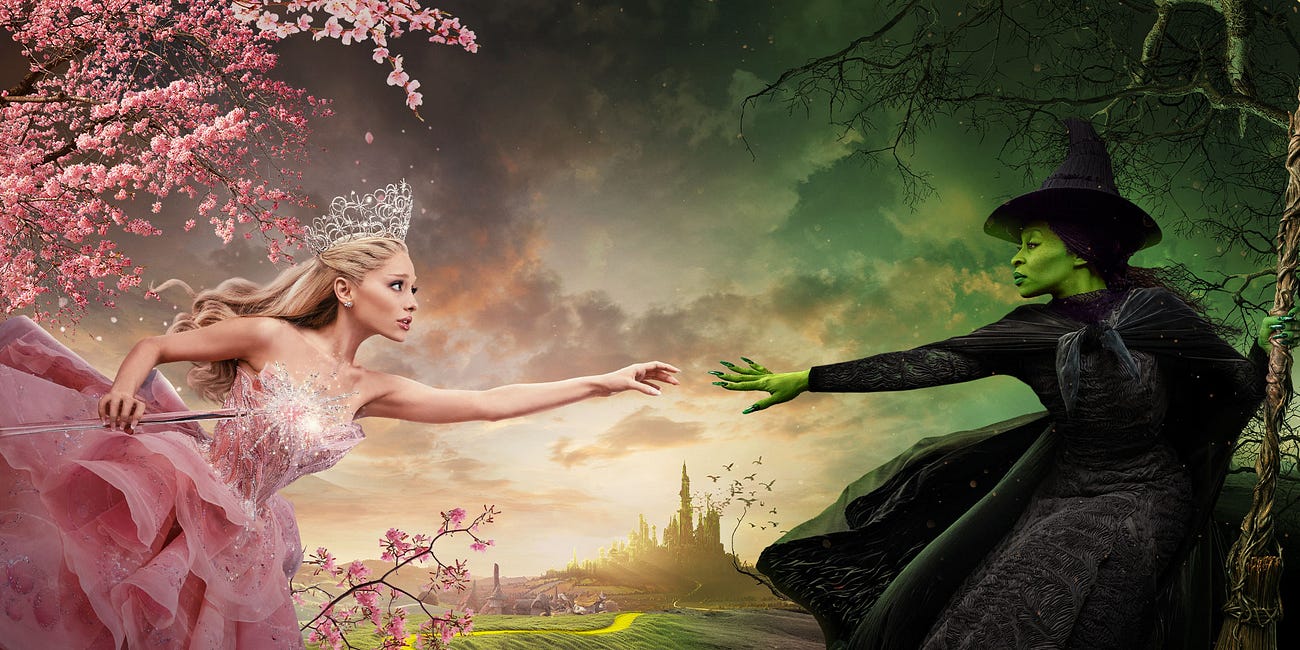One of the best things about being a fitness instructor—besides watching grown adults tremble in a squat like they owe the mafia money—is hacking the collective mood of a class.
When I started teaching four months ago—first barre basics and now hot Pilates—I knew I wanted to experiment. What if I could mix hypnotherapy into workouts? Could I trick people into enjoying chair position? No. But I could distract them from how much they hate it.
Words are magic. No wands required—just well-timed sarcasm and the right playlist. Every day, we throw sounds into the universe that shape our world—words that can heal, hurt, or, in my case, trick people into thinking one more push-up won’t kill them.
At the start of every class, I ask my students to rate their energy—both physically and emotionally—on a scale of 1 to 10. I use a highly sophisticated measurement: playful groans, blank stares, and knowing smirks from my regulars. By the end, nearly every student’s number has shot up. Whether it’s the sweat-fueled endorphins or the possibility that I’ve hypnotized them into feeling better, it’s always a win.
I’ve come to realize that ‘suggestion’ is everything. Tell people they’re exhausted, and they’ll feel it. Tell them they’re strong, and suddenly—one more push-up doesn’t seem impossible. Hypnotherapy isn’t just for deep trances; it’s in the subtle shifts of belief. It’s in the way I frame the challenge ahead, the music I play, and the words I choose. “I know it burns but you can do this!” I say, not just because it’s true, but because when people believe it, they feel it. And when they feel it, they become it.
I love to fire up the class by joking, “You’ve survived worse than this! Remember childbirth? Or those endless Zoom meetings in 2020?” And when those final, impossible reps come around, the music drowns out the screams of muscles begging for mercy. Then comes the soft landing: a cool-down with a breathing exercise in a restorative pose—often pigeon —where I invite them to inhale gratitude for their bodies and exhale gratitude for one another.
What I hadn’t realized until recently is that this simple practice is part of something much deeper—a concept called Matrixial Theory.
The Invisible Threads Between Us
After one particularly inspiring class, a barre student—who’s in the middle of her PhD in education—stayed behind to chat. She said the language I used during cool-down reminded her of Matrixial Theory, a feminist framework developed by Bracha L. Ettinger (yes, the multi-talented psychoanalyst, philosopher, and artist). This theory explores how our sense of self is not formed in isolation but interlaced with our relationships, suggesting that our identities are shaped by connection long before we even take our first breath. (If you’re curious to read deeper into Ettinger’s work, check out “Feminist Psychoanalysis: Notes on Bracha Ettinger.”)
Then, the PHD barre student hit me with a metaphor that changed the way I saw everything:
Before we were fully formed humans, we were shaped—physically, emotionally—by a stranger’s body. Before we even knew our mothers or understood that connection, they carried and nurtured us. The thought lingered, pressing against something deep inside me.
Had I ever really considered that my first experience of being held, of existing, was through someone else’s body? That before I could claim my own space in the world, I was carried within another?
Bracha L. Ettinger, Chrysalis, 2016, ink on notebook paper, 6 x 5 3/4″.
That realization rattled me. And yet, in some ways, it made perfect sense. If my first home was inside someone else, is it any wonder I spent my life searching for that feeling again?
The barre student and I talked right up until I had to teach my next class. I felt like modern-day Nancy Drew and her friend, chasing an earth-shattering secret! Then, in a plot twist I didn’t see coming, she invited me to a Zoom presentation with the Bracha Ettinger. I said yes immediately—partly out of curiosity, partly to see where this unexpected thread might lead. Curious, I looked up more about Ettinger’s work.
Here's a glimpse of the woman behind this fascinating theory:
That conversation with the PhD student lingered with me all week.
Then, as if on cue, another student—a woman in her early 40s juggling two small children and a busy schedule—stayed after class to tell me how much she appreciated my energy. Her words hit me harder than I expected. As someone who’s spent years battling self-worth (and, not to brag, navigating the rocky world of being an unemployed actress), being truly ‘seen’ felt like filling a long-forgotten void. I explained that I genuinely believe we influence each other’s energy in ways we barely notice. I even mentioned Matrixial Theory—the idea that we were all once carried by a stranger.
Her eyes widened in recognition; she had felt that truth firsthand through pregnancy and childbirth. She then recalled her second child’s birth as transcendental—a moment made magical by hypnobirthing. Visualizing her unborn baby as someone knocking at a heavy door in need of help, she experienced an ease and power she’d never known. It was her role to help her child push through this door.
It was hard to believe I was having these intimate conversations with strangers (although, not strangers anymore) just a week apart. And then, in one of those moments of candid conversation, she added, “As profound as childbirth is, not everyone needs to have children.”
I appreciated her saying that. I shared with her that I’d always assumed I’d have kids one day. But after years of reflection—and now, as I push 41—I’ve come to realize that it isn’t my path. Instead, I’ve found another kind of mothering: nurturing my friends’ and family’s kids and holding space for adults who might have missed out on that care when they needed it most.
I realized we were experiencing a true Matrixial moment—a quiet affirmation of the invisible threads connecting us.
It made me wonder: If we are shaped by connection before we’re even born, then what about after? What about the ways we shape and carry each other throughout life?
Ubuntu and Big Magic
As it turns out, there’s a name for this idea—Ubuntu.
Ubuntu is a South African philosophy and proverb that embodies the idea that our very existence is defined by our relationships with others. At its core, Ubuntu teaches: “I am because we are.” It suggests that our humanity is not an individual pursuit but a shared experience, shaped by the people around us.
Buzzing with inspiration, I knew I had to write about it. Some ideas don’t come solely from within—they ignite in the space between people. In her book, “Big Magic”
describes ‘ideas as living entities’ that move between people, waiting for the right collaborator.The more I write essays, the more I see that many of my creative sparks emerge from a series of synchronistic encounters. In these moments, a through-line forms, as if ideas are not just mine but something larger—something that finds me through the people I meet.
*FYI – Liz writes an incredible newsletter called, Letters From Love with Elizabeth Gilbert, I highly recommend to check out her magical, flourishing community.
If Matrixial Theory suggests we are shaped by connection before birth, Ubuntu takes it a step further—reminding us that our very being is co-created through community.
Martha Beck once discussed Ubuntu on The Diary of a CEO podcast, noting that in many African languages, there isn’t even a word for ‘alone’—the closest translation is “a person who needs help.” I can’t help but giggle at that: while Western culture often glorifies radical independence, many African cultures recognize that being ‘alone’ simply means you could use a little support.
And interestingly, this interconnected way of living echoes deeply in Christian teachings. Consider Paul’s words in Romans 12: “In Christ we, though many, form one body, and each member belongs to all the others.” The message is clear: we are not meant to exist in isolation. Our lives, our struggles, and our victories are intertwined.
In my fitness classes, I’m not just witnessing Ubuntu—I’m living it. It’s in the shared burn of a workout, in the laughter and dance moves between sets, in the way one person’s effort can lift the energy of the entire room. Whether in faith, philosophy, or fitness, the truth remains the same: we belong to each other.
Musical Connections & Tears
Before the holidays, a male student lingered after class and confided that he’d recently lost his mother. As I played Eva Cassidy’s “Songbird” during cool-down, he fought to keep his tears at bay. Music, a challenging workout, and that rare moment of stillness unlocked the grief, sorrow, and love he felt for his mother. Maybe that’s the strange magic of connection—it finds us even when we’re not looking for it, through music, movement, or a shared space.
“I never cry in public he said, but that song…” he trailed off. At loss for words, I was honoured he shared that with me.
I’ve cried to Eva Cassidy more than once. I dare you, to try listening to Fields of Gold without feeling your heart catch in your throat. Back in college, my roommate used to play it on her guitar while I sang along—though if we’re being honest, I probably traumatized the neighbors more than moved them. (Think less Eva Cassidy, more dying seagulls).
Not long after that encounter, another touching conversation unfolded. A mother whose adult daughter was visiting all the way from Australia stayed after class. (It was her first barre class and she nailed it!) She was wrestling with the pain of knowing visits with her daughter would be few and far between, and before I knew it, she broke down.
“I’m sorry -- I don’t know why I’m crying…” She said.
I wrapped her in a hug and reassured her that vulnerability isn’t odd—it’s simply human. I even confessed that I’ve cried in pigeon pose more times than I can count (though that’s definitely not in the class description!).
In both encounters, I was honoured to hold space for these two strangers (not strangers anymore) who felt safe enough to share their grief with me.
We Are Hardwired for Connection
In today’s world—where global politics and a rising tide of individualism threaten our ability to understand our responsibility to each other—I find comfort in knowing we’re hardwired for connection.
I recently had a lively Instagram conversation on the topic of individualism versus collectivism. I suggested that the rise of individualism in North America is causing people to deem one another as “other,” and that we needed to be more ‘collective’ in our politics and treatment of each other. I’ve always been proud to be Canadian—a nation that values caring for one another through universal healthcare and supportive social systems. And while President Trump may wish we’d become the 51st state, we know our strength lies in our ability to balance individual freedoms with collective care.
I asked my instagram audience for feedback on the topic and two insightful souls, Corrine and Stephanie, shared their thoughts. Corrine remarked, “I think we are definitely shaped by those around us who have influence, but I think we need to take care of ourselves—not selfishly, but in such a way that we can contribute fully to our community.”
Stephanie added an excellent point: the benefit of individualism is that it allows people to push back against sheep-like, hive-mind thinking—where everyone follows the same path without question.
That balance—between independence and interdependence—isn’t just a political question; it’s deeply personal. When I think about Matrixial Theory and Ubuntu, I see the same delicate balance at play. We are individuals, yes—but we are also shaped, supported, and carried by others. True strength doesn’t come from radical independence alone; it comes from knowing when to stand alone and when to lean on others.
We’re living in a pivotal moment in history, and many of us are grappling with how to use our voices and take action against the injustices unfolding in our politics. Maybe the biggest political act of all: is choosing to see each other, choosing to resist the forces that tell us it’s us against ‘them.’ We must resist those voices that tell us that we don’t owe each other anything. The truth is, we do! We owe each other our presence, our effort, our willingness to lift when someone else is too tired to stand.
In the end, we are all carried by strangers. But the real magic? Recognizing when it’s our turn to carry someone else. Because politics isn’t just about policy—it’s about how we show up for each other, every single day.
Question for the comments: Think back to a time when a stranger’s kindness lifted you up—or when you became that lifeline for someone else. What did it feel like? Did you recognize the moment as it happened, or only in hindsight? I’d love to hear your story.
Have a lovely day,
xoxo
Ashley aka Fake Guru
If you’d like to share this article with a friend, subscribe to Wannabe Wisdom, Diaries of a Fake Guru, or leave a comment, you can do all that here:
If you enjoyed today’s Diaries of A Fake Guru, you’d probably love this one too:










Another fabulous read Ashley! This made me think about a friend who suffers from depression, and the paradox of needing community yet self-isolating due to feelings of overwhelm. As well, the idea that being ultra-independent is actually a trauma response, and without community, we are unable to connect and heal but instead are tricked into believing that we don't need help. The question becomes how do we convince those we care about that isolation and independence can be more harmful than helpful? I try to extend words of encouragement, but it doesn't always work.